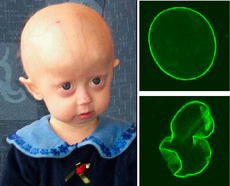Visit and Join the WeHeal Progeria Community
For more information, see: MayoClinic | Wikipedia

A progressive genetic disorder that causes children to age rapidly, beginning in their first two years of life. The average life expectancy for a child with progeria is about 13, but some with the disease die younger and some live 20 years or longer. Heart problems or strokes are the eventual cause of death in most children with progeria. Hutchinson-Gilford Progeria Syndrome (“Progeria”, or “HGPS”) is a rare, fatal genetic condition characterized by an appearance of accelerated aging in children. Its name is derived from the Greek and means “prematurely old.” While there are different forms of Progeria*, the classic type is Hutchinson-Gilford Progeria Syndrome, which was named after the doctors who first described it in England; in 1886 by Dr. Jonathan Hutchinson and in 1897 by Dr. Hastings Gilford.
HGPS is caused by a mutation in the gene called LMNA (pronounced, lamin – a). The LMNA gene produces the Lamin A protein, which is the structural scaffolding that holds the nucleus of a cell together. Researchers now believe that the defective Lamin A protein makes the nucleus unstable. That cellular instability appears to lead to the process of premature aging in Progeria.
Although they are born looking healthy, children with Progeria begin to display many characteristics of accelerated aging at around 18-24 months of age. Progeria signs include growth failure, loss of body fat and hair, aged-looking skin, stiffness of joints, hip dislocation, generalized atherosclerosis, cardiovascular (heart) disease and stroke. The children have a remarkably similar appearance, despite differing ethnic backgrounds. Children with Progeria die of atherosclerosis (heart disease) at an average age of fourteen years.
* Other progeroid syndromes include Werner’s syndrome, also known as “adult progeria” which does not have an onset until the late teen years, with a life span into the 40’s and 50’s.
Visit and Join the WeHeal Progeria Community
For more information, see: MayoClinic | Wikipedia
WeHeal is very grateful to our valued sources of information which include Wikipedia, WebMD, ClinicalTrials.gov, Cancer.gov, Infoplease, and the US CDC (Center for Disease Control).